Best Reads of 2018
January 11, 2019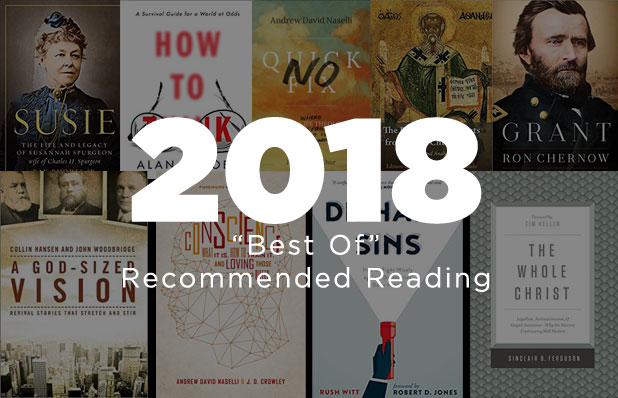
I read a number of books last year that I believe would be generally helpful to others. I tried to narrow the list to five that I believe really need to be read, but ended up with nine I would recommend for a variety of reasons.
Susie: The Life and Legacy of Susannah Spurgeon, by Ray Rhodes Jr.
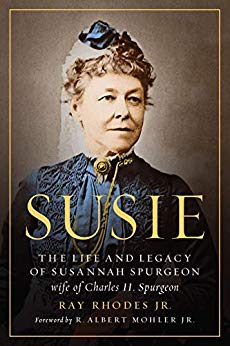 Every Christian should read this book. It’s an easy read that ends suddenly leaving you wanting more. Rhodes does an excellent job of exposing the life and character of Susie exposing the unique love this couple had for one another, specific ways she helped Spurgeon, the ways Charles discipled and inspired Susie to create her ministry to pastors, the physical challenges that plagued her from early in their marriage, and much more.
Every Christian should read this book. It’s an easy read that ends suddenly leaving you wanting more. Rhodes does an excellent job of exposing the life and character of Susie exposing the unique love this couple had for one another, specific ways she helped Spurgeon, the ways Charles discipled and inspired Susie to create her ministry to pastors, the physical challenges that plagued her from early in their marriage, and much more.
How to Think: A Survival Guide for a World at Odds, by Alan Jacobs
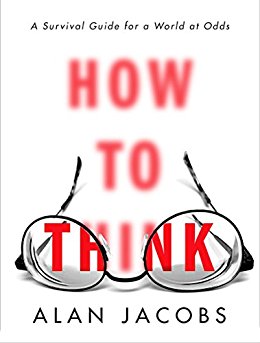 Do you struggle to process new ideas? Are you struggling to process the reality that you likely struggle with new ideas? Jacobs explains how our minds tend to shut down new ideas preventing us from truly evaluating the worth and validity of new ideas. He encourages everyone to give it 5 minutes. This book’s value comes from not only thinking about ways your mind might resist good ideas but also helps you think through how to help others think more clearly.
Do you struggle to process new ideas? Are you struggling to process the reality that you likely struggle with new ideas? Jacobs explains how our minds tend to shut down new ideas preventing us from truly evaluating the worth and validity of new ideas. He encourages everyone to give it 5 minutes. This book’s value comes from not only thinking about ways your mind might resist good ideas but also helps you think through how to help others think more clearly.
The Whole Christ, by Sinclair Ferguson
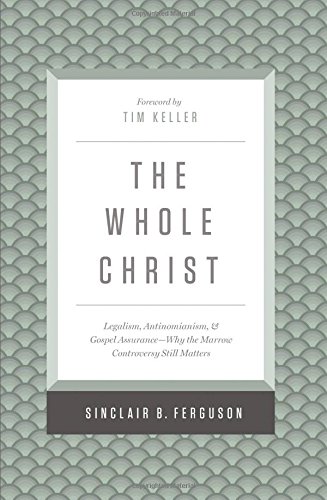 This work demonstrates further evidence that Ferguson's unique strength can't be isolated to his incredible accent. This book covers the ecclesiastical dispute occasioned by the republication of The Marrow of Modern Divinity by E. F. (believed to be Edward Fisher) which resulted in the Marrow Controversy. At first glance, you might think this sounds like an obscure, parochial topic sure to bore even the most avid of readers. However, this book brilliantly combines history, theology, application, and devotion in a powerful way. Ferguson utilizes this centuries-old debate to help modern readers get to the heart of the gospel and what sola fide truly means by analyzing how a group of Scottish pastors fought to bring about precision to what saving faith looks like.
This work demonstrates further evidence that Ferguson's unique strength can't be isolated to his incredible accent. This book covers the ecclesiastical dispute occasioned by the republication of The Marrow of Modern Divinity by E. F. (believed to be Edward Fisher) which resulted in the Marrow Controversy. At first glance, you might think this sounds like an obscure, parochial topic sure to bore even the most avid of readers. However, this book brilliantly combines history, theology, application, and devotion in a powerful way. Ferguson utilizes this centuries-old debate to help modern readers get to the heart of the gospel and what sola fide truly means by analyzing how a group of Scottish pastors fought to bring about precision to what saving faith looks like.
No Quick Fix, by Andy Naselli
 I’ve joined the Naselli fan club. Like Ferguson, Naselli writes here to analyze a centuries-old controversy with modern implications. He essentially simplified his dissertation concerning Keswick Theology, which emerged in the 1800’s famed for the tagline “just let go and let God.” I love the way Naselli takes the topic of Keswick Theology and lays out the theology and experiences that gave life to it, the historical figures associated with it, the other movements like Pentecostalism that emerged from it, as well as a careful analysis of the dangers of this theology as one who sat under it.
I’ve joined the Naselli fan club. Like Ferguson, Naselli writes here to analyze a centuries-old controversy with modern implications. He essentially simplified his dissertation concerning Keswick Theology, which emerged in the 1800’s famed for the tagline “just let go and let God.” I love the way Naselli takes the topic of Keswick Theology and lays out the theology and experiences that gave life to it, the historical figures associated with it, the other movements like Pentecostalism that emerged from it, as well as a careful analysis of the dangers of this theology as one who sat under it.
Conscience: What It Is, How to Train It, and Loving those who Differ, by Andrew David Naselli and J. D. Crowley
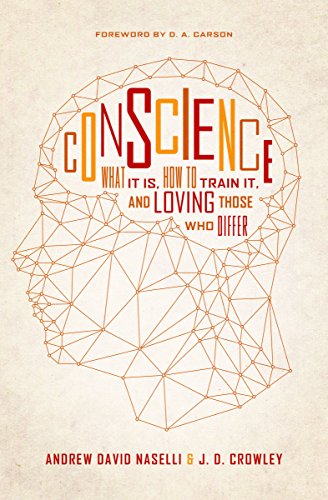 The church needed this helpful little book on an oft-overlooked aspect of the human consciousness that God hardwired humanity with for their good and God’s glory. We’ve long used Al Mohler’s brilliant article on Theological Triage at our church to help Christians recognize that not all issues of disagreement carry the same weight. This book looks deeper into what God’s Word has to say about our consciences carefully analyzing relevant texts of Scripture while offering extremely practical counsel on how to think about our consciences. Naselli and Crowley encourage us both not to violate our consciences and to submit our consciences to God as sovereign over all things including our consciences. Thanks, Thabiti Anyabwile for encouraging me to read it sooner than I would have left to myself.
The church needed this helpful little book on an oft-overlooked aspect of the human consciousness that God hardwired humanity with for their good and God’s glory. We’ve long used Al Mohler’s brilliant article on Theological Triage at our church to help Christians recognize that not all issues of disagreement carry the same weight. This book looks deeper into what God’s Word has to say about our consciences carefully analyzing relevant texts of Scripture while offering extremely practical counsel on how to think about our consciences. Naselli and Crowley encourage us both not to violate our consciences and to submit our consciences to God as sovereign over all things including our consciences. Thanks, Thabiti Anyabwile for encouraging me to read it sooner than I would have left to myself.
A God-Sized Vision, by Collin Hansen and John Woodbridge
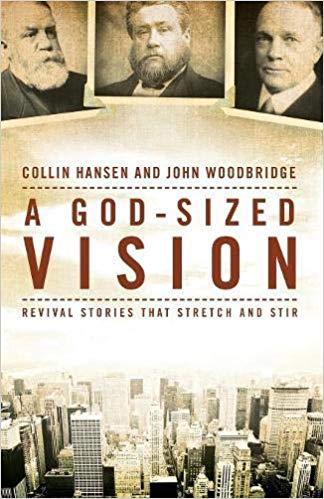 This book warmed my soul this year as I have prepared for TGC AZ’s upcoming conference on Revival. Hansen and Woodbridge encourage the church to seek revival by looking to the rich history of Revivals of the past placing each in its historical context and showing the diverse ways God chose to awaken large masses to a fresh sense of God’s glory and their need to seek Him. I’ve read biographies by Edwards, Whitfield, Graham, and others who experienced revivals. This work surveys a litany of revivals. I found myself gripped by every page and dare you to read it without tears and a prayerful longing to see God revive us again.
This book warmed my soul this year as I have prepared for TGC AZ’s upcoming conference on Revival. Hansen and Woodbridge encourage the church to seek revival by looking to the rich history of Revivals of the past placing each in its historical context and showing the diverse ways God chose to awaken large masses to a fresh sense of God’s glory and their need to seek Him. I’ve read biographies by Edwards, Whitfield, Graham, and others who experienced revivals. This work surveys a litany of revivals. I found myself gripped by every page and dare you to read it without tears and a prayerful longing to see God revive us again.
Die Hard Sins, by Rush Witt
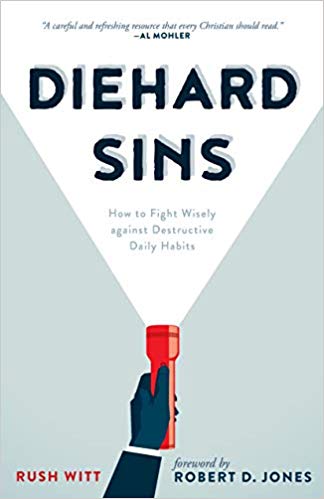 I had the opportunity to review this book for 9 Marks this past year. John Owen famously quipped, “Be killing sin, or it will be killing you.” In Diehard Sins, Rush Witt aims at equipping believers with a double-edged sword of theological and practical counsel to help you launch your grace-empowered attack on those subtler, stealth-like sins that rarely register on our moral radars. In the same vein as Respectable Sins by Jerry Bridges over a decade ago, Diehard Sins aims at both diagnosing and prescribing practical help for “the little, daily sins” that “eat up our lives from the inside out” (21). This book is chock-full of practical advice on helping yourself and others fight those subtle sins that beguile you and reads like one of Ed Welch’s or Paul Tripp’s gospel-centered counseling books. Read and fight.
I had the opportunity to review this book for 9 Marks this past year. John Owen famously quipped, “Be killing sin, or it will be killing you.” In Diehard Sins, Rush Witt aims at equipping believers with a double-edged sword of theological and practical counsel to help you launch your grace-empowered attack on those subtler, stealth-like sins that rarely register on our moral radars. In the same vein as Respectable Sins by Jerry Bridges over a decade ago, Diehard Sins aims at both diagnosing and prescribing practical help for “the little, daily sins” that “eat up our lives from the inside out” (21). This book is chock-full of practical advice on helping yourself and others fight those subtle sins that beguile you and reads like one of Ed Welch’s or Paul Tripp’s gospel-centered counseling books. Read and fight.
The Biblical Canon List from Early Christianity: Texts and Analysis, by Edmon L. Gallagher and John D. Meade
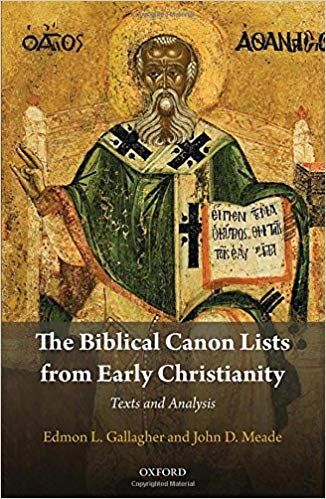 Due to the academic nature of this book, I questioned whether I should include it, but it’s too good, and it happens to be half-written by a friend and member of my church, John Meade. This book reflects thoughtful, well-researched exploration of the canon lists available to us from the annals of history, and you get to read it straight from the various authors' mouths. The authors arranged the materials according to Hebrew, Greek, and Latin traditions in addition to arranging them chronologically. My take away was that much of scholarship will need to either change their views on the original placements of various texts or at least engage this cutting-edge research. One interesting find is that it seems that while many of my seminary classes and readings said that theologians seem to favor the Hebrew ordering of the texts over the Greek ordering, it appears that Greek orderings assumed they followed an earlier Hebrew Tradition that dated back at least to the apostles.
Due to the academic nature of this book, I questioned whether I should include it, but it’s too good, and it happens to be half-written by a friend and member of my church, John Meade. This book reflects thoughtful, well-researched exploration of the canon lists available to us from the annals of history, and you get to read it straight from the various authors' mouths. The authors arranged the materials according to Hebrew, Greek, and Latin traditions in addition to arranging them chronologically. My take away was that much of scholarship will need to either change their views on the original placements of various texts or at least engage this cutting-edge research. One interesting find is that it seems that while many of my seminary classes and readings said that theologians seem to favor the Hebrew ordering of the texts over the Greek ordering, it appears that Greek orderings assumed they followed an earlier Hebrew Tradition that dated back at least to the apostles.
Grant, by Ron Chernow
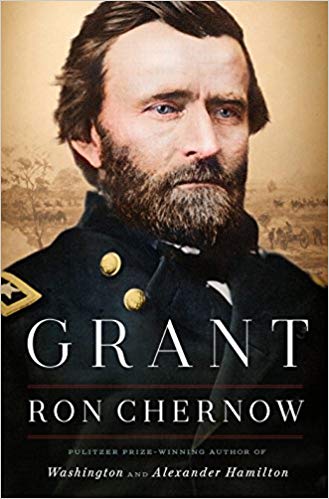 I picked up this book from Owen Strachan's recommendation last year and was not disappointed. I knew little of Ulysses S. Grant and desired to learn about this man’s life. There’s too much of interest to delve into him, but I particularly appreciated the way this author confronted readers with Grant’s struggle with alcoholism in context in such a way that it highlighted his humanity and weakness without denigrating or overshadowing his many other superlative strengths including his brilliant mind. If you are looking for a compelling and, at times, fun biography, I’d encourage you to give this one a try.
I picked up this book from Owen Strachan's recommendation last year and was not disappointed. I knew little of Ulysses S. Grant and desired to learn about this man’s life. There’s too much of interest to delve into him, but I particularly appreciated the way this author confronted readers with Grant’s struggle with alcoholism in context in such a way that it highlighted his humanity and weakness without denigrating or overshadowing his many other superlative strengths including his brilliant mind. If you are looking for a compelling and, at times, fun biography, I’d encourage you to give this one a try.